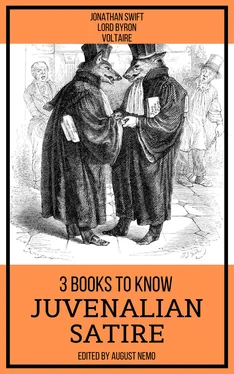As if there were no life beneath the sky
Save theirs, and that their life could never die.
They fear'd no eyes nor ears on that lone beach,
They felt no terrors from the night, they were
All in all to each other: though their speech
Was broken words, they thought a language there,—
And all the burning tongues the passions teach
Found in one sigh the best interpreter
Of nature's oracle—first love,—that all
Which Eve has left her daughters since her fall.
Haidde spoke not of scruples, ask'd no vows,
Nor offer'd any; she had never heard
Of plight and promises to be a spouse,
Or perils by a loving maid incurr'd;
She was all which pure ignorance allows,
And flew to her young mate like a young bird;
And, never having dreamt of falsehood, she
Had not one word to say of constancy.
She loved, and was beloved—she adored,
And she was worshipp'd; after nature's fashion,
Their intense souls, into each other pour'd,
If souls could die, had perish'd in that passion,—
But by degrees their senses were restored,
Again to be o'ercome, again to dash on;
And, beating 'gainst his bosom, Haidee's heart
Felt as if never more to beat apart.
Alas! they were so young, so beautiful,
So lonely, loving, helpless, and the hour
Was that in which the heart is always full,
And, having o'er itself no further power,
Prompts deeds eternity can not annul,
But pays off moments in an endless shower
Of hell-fire—all prepared for people giving
Pleasure or pain to one another living.
Alas! for Juan and Haidee! they were
So loving and so lovely—till then never,
Excepting our first parents, such a pair
Had run the risk of being damn'd for ever;
And Haidee, being devout as well as fair,
Had, doubtless, heard about the Stygian river,
And hell and purgatory—but forgot
Just in the very crisis she should not.
They look upon each other, and their eyes
Gleam in the moonlight; and her white arm clasps
Round Juan's head, and his around her lies
Half buried in the tresses which it grasps;
She sits upon his knee, and drinks his sighs,
He hers, until they end in broken gasps;
And thus they form a group that 's quite antique,
Half naked, loving, natural, and Greek.
And when those deep and burning moments pass'd,
And Juan sunk to sleep within her arms,
She slept not, but all tenderly, though fast,
Sustain'd his head upon her bosom's charms;
And now and then her eye to heaven is cast,
And then on the pale cheek her breast now warms,
Pillow'd on her o'erflowing heart, which pants
With all it granted, and with all it grants.
An infant when it gazes on a light,
A child the moment when it drains the breast,
A devotee when soars the Host in sight,
An Arab with a stranger for a guest,
A sailor when the prize has struck in fight,
A miser filling his most hoarded chest,
Feel rapture; but not such true joy are reaping
As they who watch o'er what they love while sleeping.
For there it lies so tranquil, so beloved,
All that it hath of life with us is living;
So gentle, stirless, helpless, and unmoved,
And all unconscious of the joy 't is giving;
All it hath felt, inflicted, pass'd, and proved,
Hush'd into depths beyond the watcher's diving:
There lies the thing we love with all its errors
And all its charms, like death without its terrors.
The lady watch'd her lover—and that hour
Of Love's, and Night's, and Ocean's solitude,
O'erflow'd her soul with their united power;
Amidst the barren sand and rocks so rude
She and her wave-worn love had made their bower,
Where nought upon their passion could intrude,
And all the stars that crowded the blue space
Saw nothing happier than her glowing face.
Alas! the love of women! it is known
To be a lovely and a fearful thing;
For all of theirs upon that die is thrown,
And if 't is lost, life hath no more to bring
To them but mockeries of the past alone,
And their revenge is as the tiger's spring,
Deadly, and quick, and crushing; yet, as real
Torture is theirs, what they inflict they feel.
They are right; for man, to man so oft unjust,
Is always so to women; one sole bond
Awaits them, treachery is all their trust;
Taught to conceal, their bursting hearts despond
Over their idol, till some wealthier lust
Buys them in marriage—and what rests beyond?
A thankless husband, next a faithless lover,
Then dressing, nursing, praying, and all 's over.
Some take a lover, some take drams or prayers,
Some mind their household, others dissipation,
Some run away, and but exchange their cares,
Losing the advantage of a virtuous station;
Few changes e'er can better their affairs,
Theirs being an unnatural situation,
From the dull palace to the dirty hovel:
Some play the devil, and then write a novel.
Haidee was Nature's bride, and knew not this;
Haidee was Passion's child, born where the sun
Showers triple light, and scorches even the kiss
Of his gazelle-eyed daughters; she was one
Made but to love, to feel that she was his
Who was her chosen: what was said or done
Elsewhere was nothing. She had naught to fear,
Hope, care, nor love, beyond, her heart beat here.
And oh! that quickening of the heart, that beat!
How much it costs us! yet each rising throb
Is in its cause as its effect so sweet,
That Wisdom, ever on the watch to rob
Joy of its alchymy, and to repeat
Fine truths; even Conscience, too, has a tough job
To make us understand each good old maxim,
So good—I wonder Castlereagh don't tax 'em.
And now 't was done—on the lone shore were plighted
Their hearts; the stars, their nuptial torches, shed
Beauty upon the beautiful they lighted:
Ocean their witness, and the cave their bed,
By their own feelings hallow'd and united,
Their priest was Solitude, and they were wed:
And they were happy, for to their young eyes
Each was an angel, and earth paradise.
O, Love! of whom great Caesar was the suitor,
Titus the master, Antony the slave,
Horace, Catullus, scholars, Ovid tutor,
Sappho the sage blue-stocking, in whose grave
All those may leap who rather would be neuter
(Leucadia's rock still overlooks the wave)—
O, Love! thou art the very god of evil,
For, after all, we cannot call thee devil.
Thou mak'st the chaste connubial state precarious,
And jestest with the brows of mightiest men:
Caesar and Pompey, Mahomet, Belisarius,
Have much employ'd the muse of history's pen;
Their lives and fortunes were extremely various,
Such worthies Time will never see again;
Yet to these four in three things the same luck holds,
They all were heroes, conquerors, and cuckolds.
Thou mak'st philosophers; there 's Epicurus
And Aristippus, a material crew!
Who to immoral courses would allure us
By theories quite practicable too;
If only from the devil they would insure us,
How pleasant were the maxim (not quite new),
'Eat, drink, and love, what can the rest avail us?'
So said the royal sage Sardanapalus.
But Juan! had he quite forgotten Julia?
And should he have forgotten her so soon?
I can't but say it seems to me most truly
Perplexing question; but, no doubt, the moon
Does these things for us, and whenever newly
Strong palpitation rises, 't is her boon,
Else how the devil is it that fresh features
Читать дальше












